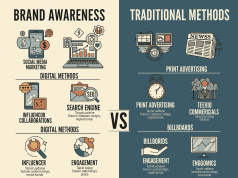In today’s fast-paced digital landscape, the ability to understand customer behavior and preferences is more crucial than ever. As businesses strive to create personalized experiences, marketing technology (martech) tools have emerged as indispensable allies in this quest. By leveraging data, these tools are unlocking profound insights that are revolutionizing how organizations approach customer engagement.
The Data-Driven Era
Gone are the days when marketing decisions were based solely on gut feelings or historical trends. Today, data is the backbone of strategic decision-making. Companies collect vast amounts of information from various sources, including social media interactions, website analytics, customer feedback, and sales figures. However, the real challenge lies in transforming this data into actionable insights.
What Are Martech Tools?
Martech tools encompass a wide range of technologies that assist marketers in planning, executing, and analyzing marketing campaigns. These tools include:
- Customer Relationship Management (CRM) Systems: Help manage customer interactions and data throughout the customer lifecycle.
- Email Marketing Platforms: Allow for segmentation and personalized messaging based on customer data.
- Marketing Automation Software: Automate repetitive tasks and optimize campaigns based on performance metrics.
- Analytics and Data Visualization Tools: Provide insights into customer behavior and campaign performance through data analysis.
Unlocking Customer Insights
Segmentation and Targeting: Martech tools enable businesses to segment their audiences more effectively. By analyzing demographic, behavioral, and psychographic data, marketers can create targeted campaigns that resonate with specific customer groups. For instance, an e-commerce platform might use data to identify high-value customers and tailor marketing strategies to retain them.
Personalization: Personalization has become a key differentiator in customer experience. Martech tools allow businesses to create dynamic content that changes based on user behavior. For example, abandoned cart emails, tailored product recommendations, and personalized landing pages can all enhance user experience and increase conversion rates.
Predictive Analytics: Predictive analytics leverages historical data and machine learning algorithms to forecast future customer behavior. By understanding trends and patterns, companies can anticipate customer needs and tailor their offerings accordingly. For instance, a subscription service might analyze past purchasing data to recommend future products.
Real-Time Insights: The ability to access real-time data enables marketers to make quick decisions and adjustments to campaigns. For example, if a particular ad isn’t performing well, immediate feedback can lead to on-the-fly tweaks, maximizing the effectiveness of advertising spend.
- Enhanced Customer Journey Mapping: Understanding the customer journey—from awareness through consideration to purchase—is vital for effective marketing. Martech tools can track customer interactions across multiple touchpoints, providing a comprehensive view of the customer journey and enabling businesses to optimize each stage.
The Role of AI and Machine Learning
Artificial Intelligence (AI) and Machine Learning (ML) are at the forefront of martech advancements. These technologies can analyze large datasets quickly, uncovering insights that might be difficult for humans to identify. AI-driven chatbots, for instance, can provide customer support while gathering data on customer inquiries, further refining marketing strategies.
Challenges and Considerations
While martech tools offer immense potential, there are challenges to consider:
Data Privacy: As data collection becomes more sophisticated, ensuring customer privacy and complying with regulations like GDPR is paramount. Businesses must be transparent about data usage and prioritize customer consent.
Integration: Many companies utilize a variety of tools, which can lead to data silos. Effective integration of these tools is essential for a coherent view of the customer.
- Skillset: With the rapid pace of technological change, marketers need to be equipped with the skills to analyze and interpret data effectively. Continuous training and education in data analytics and technology are crucial.
Conclusion
Martech tools are unlocking the potential of customer data in unprecedented ways, enabling businesses to create targeted, personalized, and impactful marketing strategies. As technology continues to evolve, leveraging data effectively will remain a critical determinant of success in the competitive landscape. Embracing martech not only enhances customer insights but also fosters a deeper connection between brands and their audiences, ultimately leading to increased loyalty and sustainable growth.









